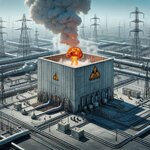The expense comes in safely getting that nuclear material to make steam.
Not just safely, but
extremely safely.
On the other hand, we allow coal and gas power plants to pollute the environment, releasing greenhouse gases and radioactive fly ash.
The operational costs of a nuclear power plant include the cost of ensuring that the plant does minimal damage to the environment. But for coal and gas these costs are simply externalised and ignored.
If we imposed regulations on coal and gas plants to maintain the same safety standards as nuclear plant, they would need to stop releasing those pollutants entirely, and that would drive up the operational costs of those plants, making them unprofitable.
Unless you put a price on environmental damage, you aren't making fair comparison of cost.
Several countries have committed to a future energy mix of renewables and fossil fuels. They actually say it will be renewables plus storage, but the storage hasn't been invented yet, so renewables will have to be shored up by fossil fuels instead. This course of action is vastly more expensive than building nuclear power, either because the environmental damage will be extraordinarily costly or the storage technology costs will make nuclear look like a bargain.



